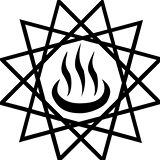by Melissa
(12 Hekatombaion) In very ancient times, the Kronia honored Kronos as a god of the grain harvest, who is depicted with a reaping hook (Parke 29) and marked the end of the cereal harvest. By the Classical Era, Kronos was known mainly as the father of Zeus. While he likely still received an offering on this day (on his altar near the Temple of Olympian Zeus), most all practices of the day had been abandoned, except for one very distinctive and odd one: on this day, slaves dined with their masters. Likely, the absence of the slaves from their usual duties ensured that very little got done that day, although that might not have been religious or civil law. Apparently, the slaves made riotous noise during their feast and time off, creating chaos throughout the city (Burkert 231). What the citizens of Athens did, other than enduring the turmoil, is not known.
Kronos, as the precursor of Zeus, was the ruler of the Golden Age, an idyllic time in Greek myth (Burkert 232). According to this site, “During the Kronia we are allowed a temporary return to the Golden Age, to equality, luxury, ease and unconstrained freedom.”
On this day, make a small sacrifice to Kronos, recite Orphic Hymn 13. This is a good day to read Hesiod’s Theogony (which can be found on the Perseus site).
Also, see modern hymns / prayers to Kronos.
Sources:
Burkert, Walter, Greek Religion, 1977, English version 1985
Parke, H.W., Festivals of the Athenians, 1977
